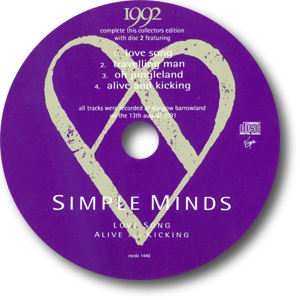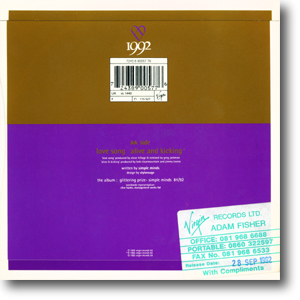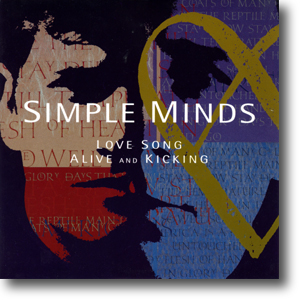- After Real Life and
the associated tour, the band took a long deserved break and
Virgin filled the gap in
the band's release schedule with the compilation album Glittering Prize 81/92.
This single was released to promote that collection.
- With no new recordings available, the record company fell back on the back catalogue, and selected two songs
to represent the band's history: Love Song was an early 'hit', but may have been
missed by more casual fans, so represented something 'new'; whilst Alive And Kicking
would've been instantly recognisable and evoke memories of Simple Minds' huge popularity in the mid 1980s.
- Another reason for considering Alive And Kicking was the availability
of various unreleased remixes by Bob Clearmountain for the original
Alive And Kicking single. These, along with the various edits and the LP version,
were collected together for consideration in July 1992. In the end, Clearmountain's remixes remained
in the vault, and would not see the light of day until the Once Upon A Time Super Deluxe box-set.
- Therefore, like the original Alive And Kicking single, Virgin were
just restricted to the edit, LP version and instrumental.
- However Love Song was remxied (slightly) for this single. Gregg Jackman,
working at Sarm in August 1992, produced "Bright" and "Warm" mixes of the original LP and edit versions of
the song. In the end, the "Bright" mix was used, although it was not given this name on the final artwork. It differed only
very slightly from the original Steve Hillage production. (One should not read
too much into this however. Some tapes exist of multiple takes of a song, with each take being an
extremely subtle variation on the same arrangement e.g. vocals up 1dB, vocals up 2dB etc. The "Bright" mix may simply
have the higher frequencies turned up a notch whilst the "Warm" mix favours the bass.)
- The 7" and cassette single carried the shorter versions of both tracks. A CD in a multiple-fold digipak included the
longer versions of Alive And Kicking and both versions of the
Love Song remix. It included space for an additional limited edition CD which
could be purchased the next week; but rather than include an empty tray in the digipak which could've caused confusion,
Virgin printed up a card "blank" to explain that the other CD had to be purchased separately.

- This second limited edition CD featured four live tracks from Simple Minds'
Barrowland performance the previous year (13th August 1991). As most of the
concert had already been mixed for a TV broadcast, it made sense to use further recordings from this show.
- The four format limit imposed by the chart compilers now bit the record company and they were effectively prevented from issuing
a 12" single. To explain the situation to fans and collectors, large 12" picture flats were added to the racks in the record shops,
explaining that there was no 12" but two CDs were available instead.
- Luckily collectors could search out the promotional 12" single which included the longer versions of both songs. Housed in a white
die-cut sleeve with sticker, these became highly sought after. This interest increased when it was discovered that some of the run
was pressed on very dark green vinyl - these have the same matrix numbers and sleeves as the normal "black" versions, so it would
appear that the pressing run started or ended with dark green vinyl. These turned out to be extremely rare.

- Some copies of the 7" were also sent out as promos. These could be identified by compliment stickers on the back of the
sleeve (as shown above by the green sticker in the bottom right corner).
- Only the first CD was distributed in Europe. As the second limited edition CD wasn't available, the packaging was
altered, so it appeared in a slim jewelcase. The colour of the CD itself was also changed from purple to light blue.
|



|



